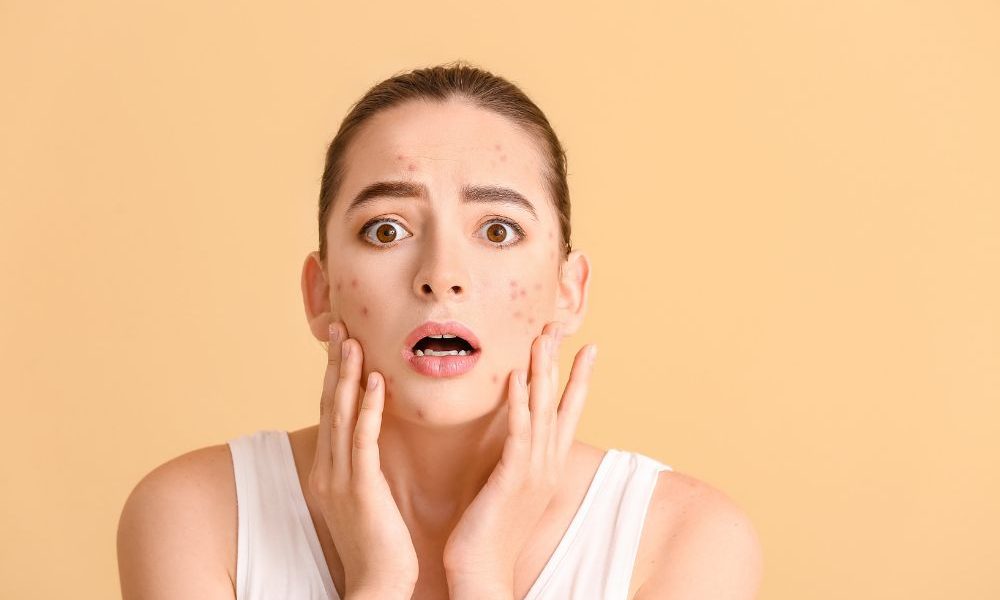We all know that stress can affect our mood, sleep, and overall health, but did you know it can also wreak havoc on your skin? Understanding the connection between stress and skin health is crucial for maintaining a clear and radiant complexion. In this article, we will explore how stress affects your skin, share expert tips for managing stress, and offer practical advice to help you achieve a glowing complexion.
How Stress Affects Your Skin
Cortisol and Breakouts
When you’re stressed, your body releases cortisol, a hormone that can increase oil production in your skin. Dr. Whitney Bowe, a board-certified dermatologist and author, explains, “Stress can wreak havoc on your skin. It triggers the release of cortisol, a hormone that increases oil production and inflammation, leading to breakouts, rashes, and other skin issues” (Source: “The Beauty of Dirty Skin”).
Skin Barrier Function
Stress can also disrupt your skin’s natural barrier function, making it more susceptible to dehydration, irritation, and premature aging. Dr. Howard Murad, dermatologist and founder of Murad Skincare, notes, “Stress disrupts the skin’s natural barrier function, making it more susceptible to dehydration, irritation, and premature aging. To maintain a healthy complexion, it’s important to manage stress through relaxation techniques, exercise, and a balanced diet” (Source: Murad Skincare).
Mind-Skin Connection
The mind-skin connection is powerful. Dr. Amy Wechsler, dermatologist and psychiatrist, emphasizes, “The mind-skin connection is undeniable. When you’re stressed, it shows on your skin. By prioritizing stress management, you can not only improve your overall well-being but also achieve a clearer, healthier complexion” (Source: “The Mind-Beauty Connection”).
Managing Stress for Better Skin
Relaxation Techniques
Incorporating relaxation techniques into your daily routine can help reduce stress levels and improve your skin. Consider practices like deep breathing exercises, meditation, yoga, and progressive muscle relaxation. These activities can help calm your mind and reduce cortisol levels.
Regular Exercise
Exercise is a natural stress reliever. It boosts endorphins, improves mood, and helps regulate cortisol levels. Aim for at least 30 minutes of moderate exercise most days of the week. Whether it’s a brisk walk, a bike ride, or a dance class, find an activity you enjoy and make it a regular part of your routine.
Balanced Diet
A balanced diet is essential for managing stress and maintaining healthy skin. Foods rich in antioxidants, vitamins, and minerals can help protect your skin from the damaging effects of stress. Incorporate plenty of fruits, vegetables, whole grains, lean proteins, and healthy fats into your diet. Avoid excessive caffeine, sugar, and processed foods, which can exacerbate stress and skin issues.
Personal Anecdote
I used to experience frequent breakouts whenever I was stressed, especially during busy work periods. After reading about the importance of stress management for skin health, I decided to try yoga. I started with just 10 minutes a day, and over time, I noticed a significant improvement in both my stress levels and my skin. The breakouts became less frequent, and my complexion appeared more radiant. This experience taught me the importance of managing stress for overall well-being and clear skin.
Incorporating Stress-Relieving Rituals into Your Skincare Routine
Facial Massage
Facial massage can help reduce stress and improve skin circulation. It promotes relaxation and can enhance the effectiveness of your skincare products. Tata Harper, founder of Tata Harper Skincare, suggests, “Incorporate stress-relieving rituals into your skincare routine, such as facial massage or aromatherapy. These practices can help calm the mind and promote relaxation, which in turn benefits the skin” (Source: Tata Harper Skincare).
Aromatherapy
Aromatherapy can be a powerful tool for managing stress. Essential oils like lavender, chamomile, and frankincense have calming properties that can help reduce anxiety and improve sleep. Add a few drops to a diffuser, your bath, or even your moisturizer for a soothing experience.
Hydrating Masks
Hydrating masks can help replenish moisture and soothe irritated skin. Look for masks with ingredients like hyaluronic acid, aloe vera, and cucumber extract. Using a hydrating mask once or twice a week can provide a much-needed boost for stressed skin.
Expert Tips for Managing Stress-Related Skin Issues
Breakouts
For stress-related breakouts, focus on keeping your skin clean and hydrated. Use a gentle cleanser to remove excess oil and impurities without stripping your skin. Incorporate spot treatments with salicylic acid or benzoyl peroxide to target blemishes. Ensure you are moisturizing with a non-comedogenic moisturizer to keep your skin balanced.
Redness and Irritation
If stress is causing redness and irritation, look for soothing ingredients like chamomile, green tea, and aloe vera. These ingredients can help calm inflammation and reduce redness. Avoid harsh exfoliants and products with alcohol, which can further irritate sensitive skin.
Dryness and Dehydration
For dryness and dehydration, focus on hydrating products that help restore your skin’s moisture barrier. Look for ingredients like hyaluronic acid, glycerin, and ceramides. Incorporate a hydrating serum into your routine and follow with a rich moisturizer. Drink plenty of water throughout the day to stay hydrated from the inside out.
Unique Studies Supporting the Mind-Skin Connection
The Association Between Stress and Acne
A systematic review and meta-analysis published in the Journal of the American Academy of Dermatology (2020) found a significant association between stress and acne severity. This study highlights the importance of stress management in acne treatment and prevention. Managing stress through relaxation techniques and a balanced lifestyle can help reduce acne flare-ups.
Mindfulness-Based Stress Reduction and Skin Health
A study in the British Journal of Dermatology (2018) investigated the impact of mindfulness-based stress reduction (MBSR) on skin barrier function and quality of life in patients with atopic dermatitis, a chronic inflammatory skin condition often exacerbated by stress. The results showed that MBSR can improve skin barrier function, reduce inflammation, and enhance overall well-being in individuals with atopic dermatitis. This research underscores the benefits of mindfulness practices for managing stress and improving skin health.
Taking care of your skin starts with managing stress. By incorporating relaxation techniques, exercise, and a balanced diet into your routine, you can reduce the impact of stress on your skin and achieve a clearer, healthier complexion. Share your stress management and skincare tips with us and join our community of beauty enthusiasts. For more articles on skincare and wellness, visit our website and subscribe to our newsletter.
Managing stress is not just about feeling better mentally; it also reflects on your skin. Prioritize stress management, and let your radiant skin be a testament to your inner calm and well-being!




